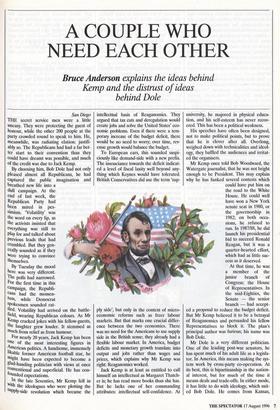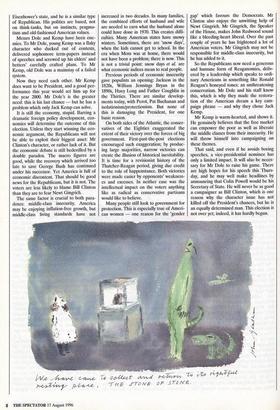A COUPLE WHO NEED EACH OTHER
Bruce Anderson explains the ideas behind Kemp and the distrust of ideas behind Dole
San Diego THE secret service men were a little uneasy. They were protecting the guest of honour, while the other 200 people at the Party crowded round to speak to him. He, meanwhile, was radiating elation: justifi- ably so. The Republicans had had a far bet- ter start to their convention than they could have dreamt was possible, and much of the credit was due to Jack Kemp.
For nearly 20 years, Jack Kemp has been One of the most interesting figures in Americanpolitics. A handsome, immensely likable former American football star, he Might have been expected to become a glad-handing politician with views at once conventional and superficial. He has con- founded expectations. In the late Seventies, Mr Kemp fell in with the ideologues who were plotting the stIPPly-side revolution which became the
intellectual basis of Reaganomics. They argued that tax cuts and deregulation would create jobs and solve the United States' eco- nomic problems. Even if there were a tem- porary increase of the budget deficit, there would be no need to worry; over time, rev- enue growth would balance the budget.
To European ears, this sounded suspi- ciously like demand-side with a new prefix. The insouciance towards the deficit indicat- ed a level of fiscal laxity well beyond any- thing which Keynes would have tolerated. British Conservatives did use the term 'sup- ply side', but only in the context of micro- economic reforms such as freer labour markets. But that marks one crucial differ- ence between the two economies. There was no need for the Americans to use supply side in the British sense; they already had a flexible labour market. In America, budget deficits and monetary growth translate into output and jobs rather than wages and prices, which explains why Mr Kemp was right: Reaganomics worked.
Jack Kemp is at least as entitled to call himself an intellectual as Margaret Thatch- er is; he has read more books than she has. But he lacks one of her commanding attributes: intellectual self-confidence. At university, he majored in physical educa- tion, and his self-esteem has never recov- ered. This has been a political weakness. His speeches have often been designed, not to make political points, but to prove that he is clever after all. Overlong, weighed down with technicalities and ideol- ogy, they baffled the audiences and irritat- ed the organisers.
At that time, he was a member of the junior branch of Congress: the House of Representatives. In the mid-Eighties, the Senate — the senior branch — had accept- ed a proposal to reduce the budget deficit. But Mr Kemp believed it to be a betrayal of Reaganomics and persuaded his fellow Representatives to block it. The plan's principal author was furious; his name was Bob Dole.
Mr Dole is a very different politician. One of the leading post-war senators, he has spent much of his adult life as a legisla- tor. In America, this means making the sys- tem work by cross-party co-operation. At its best, this is bipartisanship in the nation- al interest, but for much of the time it means deals and trade-offs. In either mode, it has little to do with ideology, which suit- ed Bob Dole. He comes from Kansas,
Eisenhower's state, and he is a similar type of Republican. His politics are based, not on think-tanks, but on instincts, pragma- tism and old-fashioned American values.
Messrs Dole and Kemp have been ene- mies. To Mr Dole, young Kemp was a flaky character who ducked out of contests, delivered sophomore term-papers instead of speeches and screwed up his elders' and - betters' carefully crafted plans. To Mr Kemp, old Dole was a mainstay of a failed system.
Now they need each other. Mr Kemp does want to be President, and a good per- formance this year would set him up for the year 2000. Mr Dole's is the greater need: this is his last chance — but he has a problem which only Jack Kemp can solve.
It is still the economy, stupid. Barring a dramatic foreign policy development, eco- nomics will determine the outcome of this election. Unless they start winning the eco- nomic argument, the Republicans will not be able to exploit their biggest asset: Mr Clinton's character, or rather lack of it. But the economic debate is still bedevilled by a double paradox. The macro figures are good, while the recovery which arrived too late to save George Bush has continued under his successor. Yet America is full of economic discontent. That should be good news for the Republicans, but it is not. The voters are less likely to blame Bill Clinton than they are to fear Newt Gingrich.
The same factor is crucial to both para- doxes: middle-class insecurity. America may be enjoying inflation-free growth, but middle-class living standards have not increased in two decades. In many families, the combined efforts of husband and wife are needed to earn what the husband alone could have done in 1970. This creates diffi- culties. Many American states have snowy winters. Sometimes, there are 'snow days', when the kids cannot get to school. In the era when Mom was at home, there would not have been a problem; there is now. This is not a trivial point: snow days et al are what economic indices mean to real people.
Previous periods of economic insecurity gave populists an opening: Jackson in the 1820s, William Jennings Bryan in the 1890s, Huey Long and Father Coughlin in the Thirties. There are similar develop- ments today, with Perot, Pat Buchanan and isolationism/protectionism. But none of this is damaging the President, for one basic reason.
On both sides of the Atlantic, the conser- vatives of the Eighties exaggerated the extent of their victory over the forces of big government. First-past-the-post elections encouraged such exaggeration; by produc- ing large majorities, narrow victories can create the illusion of historical inevitability. It is time for a revisionist history of the Thatcher-Reagan period, giving due credit to the role of happenstance. Both victories were made easier by opponents' weakness- es and excesses. In neither case was the intellectual impact on the voters anything like as radical as conservative partisans would like to believe.
Many people still look to government for protection. This is especially true of Ameri- can women — one reason for the 'gender gap' which favours the Democrats. Mr Clinton also enjoys the unwitting help of Newt Gingrich. Mr Gingrich, the Speaker of the House, makes John Redwood sound like a bleeding-heart liberal. Over the past couple of years he has frightened a lot of American voters. Mr Gingrich may not be responsible for middle-class insecurity, but he has added to it.
So the Republicans now need a generous and humane form of Reaganomics, deliv- ered by a leadership which speaks to ordi- nary Americans in something like Ronald Reagan's honeyed tones: an unthreatening conservatism. Mr Dole and his staff know this, which is why they made the restora- tion of the American dream a key cam- paign phrase — and why they chose Jack Kemp.
Mr Kemp is warm-hearted, and shows it. He genuinely believes that the free market can empower the poor as well as liberate the middle classes from their insecurity. He will throw himself into campaigning on these themes.
That said, and even if he avoids boring speeches, a vice-presidential nominee has only a limited impact. It will also be neces- sary for Mr Dole to raise his game. There are high hopes for his speech this Thurs- day, and he may well make headlines by announcing that Colin Powell would be his Secretary of State. He will never be as good a campaigner as Bill Clinton, which is one reason why the character issue has not killed off the President's chances, but he is an equally determined man. This election is not over yet; indeed, it has hardly begun.



















































 Previous page
Previous page